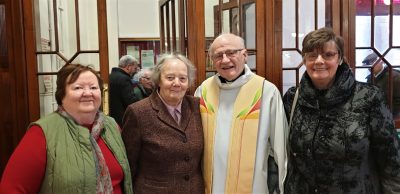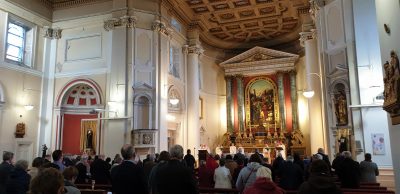
By Sarah Mac Donald - 03 February, 2020
 The Pioneer Total Abstinence Association has had “a remarkable effect” on Irish Society, Archbishop Diarmuid Martin has said and he added that the Association continues to do so today “in the face of increased abuse of alcohol and other substances”.
The Pioneer Total Abstinence Association has had “a remarkable effect” on Irish Society, Archbishop Diarmuid Martin has said and he added that the Association continues to do so today “in the face of increased abuse of alcohol and other substances”.
Speaking at a Mass in St Francis Xavier Church on Dublin’s Gardiner Street, where the Association was founded 120 years ago by Jesuit Fr James Cullen, Archbishop Martin paid tribute to the PTAA for taking a stand against the huge investment and false idealisation of a drinking culture by the drinks industry.
In his homily for the concelebrated Mass attended by representatives of the Association from around the country, Dr Martin said the spirituality of the Pioneer Association recognised how self-giving love is manifested in sobriety.
“Sobriety is about using the things of God’s creation in the terms in which God created them. Sobriety is a path towards human fulfilment that shuns narcissism or self-indulgence,” he stated.
Archbishop Martin added that the compassion of the member of the Pioneer Association is shown through witnessing to moderation in “a world driven by a consumerism that leads to emptiness.”
Moderation, he said, is an antidote to a race towards having and possessing without frontiers.
However, he said many tend to look on the mission of the Pioneer Association only in a negative framework.
For them being a Pioneer is primarily about renouncing something.
He continued, “The work of and the spirit of the Pioneer Association is however much more than renunciation. Being a Pioneer, like being a Christian, is above all a call to witness to love.”
The underlying ethos of the Pioneer Association is not one of looking after oneself. “It is much more in line with the vision of our Gospel reading. It is about a compassion that lies in giving without hoping for anything in return,” the Archbishop stated,
 On the Pioneer Association’s witness to love, he said this was witnessed to in reparation.
On the Pioneer Association’s witness to love, he said this was witnessed to in reparation.
But the concept of reparation was not one that is easy for our culture to understand.
“If anything, there is a tendency today to say that it is hard enough to assume responsibility for my own life and that I have no responsibility for the lives and even less for the failings of others. People ask why I should undertake a path of conversion in order to supply for the faults and failings of someone else.”
Though anyone could renounce recourse to alcohol and for variety of reasons, the Pioneer Association’s renunciation, he said, is a statement of “another type of social responsibility. It is a vocation to reparation.”
“It is a call to association with the Jesus, our Redeemer, who undertook his life of self-giving and suffering so that life and love could triumph for all.”
He also paid tribute to Gardiner Street which which saw the birth of the Pioneer movement and which he said had a special place in the spiritual life of Dublin’s inner city. Matt Talbot was a frequent visitor to the church.
Referring to the First Reading for Saturday’s Mass from the Book of Job, the Archbishop said it had struck him in a particular way at a moment when Irish society prepares for a General Election and is reflecting on what kind of society it wishes to see constructed.
“The reading from Job looks at that very question of the type of society we wish to attain, but not in terms of political programmes or electoral promises. It brings the question back to the heart of each of us. It poses questions of how my individual lifestyle can be shaped in such a way that social policy will not remain an abstract idea or just an electoral promise but something that truly has a heart because it springs from our hearts.”
Speaking on the Feast of St Brigid he said she showed that society can be changed by the witness of personal generosity and caring.
“Each of us is called to examine ourselves as to how I care for orphans or widows and those who are alone in their need. Each of us has to take a radical look at how I reach out to and not just talk about the hungry and the naked. Each of has to ask about where my heart lies regarding wealth and security. Each of us must look at the final sentence of our reading and ask exactly how we contribute to a world in which we would be able to say: ‘No stranger ever had to sleep outside and my door was always open to the traveller’.”
Dr Martin said the essence of the Christian life is not about strategies or rules and norms. The message of Jesus Christ is not a message of negatives. It is message in which care and concern dominate because the Christian message is a message of love.
“Radical love is not an optional added to our daily lives. It is not the honours course of the Christian life, which is there for some but which we can leave aside when it becomes burdensome or which we can reject because it asks too much.”
 After Mass, Sr Consilio Fitzgerald of Cuan Mhuire, described calls for legalisation of cannabis as “crazy” warning of its effects on the brain.
After Mass, Sr Consilio Fitzgerald of Cuan Mhuire, described calls for legalisation of cannabis as “crazy” warning of its effects on the brain.
“If you take heroin, it will be out of your system in 48 hours. If you smoke a joint today, it will be still in your system in 28 days’ time,” the Mercy Sister said and highlighted that cannabis could trigger paranoia and other serious mental health problems.
“It is terribly dangerous – the worst of them,” she told CatholicIreland.net
She appealed to whoever is elected to government to make more money available for addiction treatment services. “So much more could be done, and so many more people could be helped, if more money was made available,” she stressed.
The Mercy nun also appealed for more education of young people on the dangers of drug and alcohol addiction and said this should begin in primary school.
“Secondary school is too late – they are starting at twelve or thirteen,” she warned.
Fr Barney McGuckian of the Pioneer Association urged parents to think twice before introducing their teenage children to alcohol, highlighting that it has no medical benefit for a growing body and that it was often “an introductory drug to all the others,” he said.
“When I started off in the 1970s doing this work, the big concern was teenage drinking; in the 1980s it was teenage drunkenness; and in the 1990s it was drugs plus – use your imagination for what has happened in the last 20 years,” he said.
He recalled working with the renowned athlete Ronnie Delaney and the slogan they promoted then was ‘Off drink until 18, off drugs for life’.
“It is a very good idea because often alcohol is an introductory drug to all the others,” Fr McGuckian said.